Introduction
Golang, a simple yet powerful programming language is fast becoming the top choice when building web servers. In this tutorial, I’ll show you how easy it is to build a web application with Golang.
For this example, we’ll be using Gin Web Framework. Gin is an excellent framework for API development due to its speed and simplicity.
Target Audience
This article is for anyone with experience programming in Golang and also familiar with building RESTful APIs for their applications. Kindly check out my article on Getting started with Golang to get started.
Prerequisites
To follow along with this tutorial, you will need:
You need to install Go. For that, visit the official Go download page, and download it for your specific machine.
A working knowledge of Golang.
The basics of MongoDB.
A good understanding of building REST APIs.
Step 1 — Project Setup
Create a project folder structure
mkdir book-app-tutorial
cd book-app-tutorial
- Create
go.modfile by running the commandgo mod init github.com/<your-github-username>/book-app-tutorial
mkdir controller database model routes
touch main.go controller/book.controller.go database/database.connection.go model/book.go routes/book.route.go .env
- Install packages we'll need for our project.
go get -u github.com/gin-gonic/gin
go get go.mongodb.org/mongo-driver/mongo
go get github.com/joho/godotenv
go get github.com/go-playground/validator/v10
Our project structure should look as shown below ⬇️
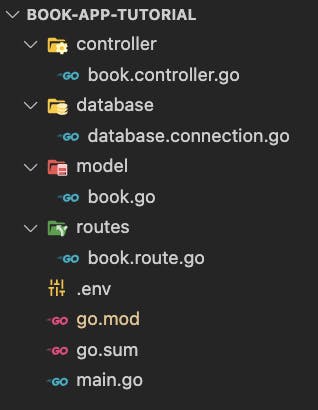
Step 2 — Database and model setup.
- Step 2.1 : In
database/database.connection.go. Now let's implement the MongoDB connection for our application.
If you have issues setting up MongoDB compass locally, kindly check this out.
package database
import (
"context"
"fmt"
"log"
"os"
"time"
"github.com/joho/godotenv"
"go.mongodb.org/mongo-driver/mongo"
"go.mongodb.org/mongo-driver/mongo/options"
)
func DBinstance() *mongo.Client {
err := godotenv.Load(".env")
if err != nil {
log.Fatal("Error loading .env file")
}
MongoDB := os.Getenv("MONGODB_URL")
client, err := mongo.NewClient(options.Client().ApplyURI(MongoDB))
if err != nil {
log.Fatal(err)
}
ctx, cancel := context.WithTimeout(context.Background(), 10*time.Second)
defer cancel()
err = client.Connect(ctx)
if err != nil {
log.Fatal(err)
}
fmt.Println("Connected to MongoDB")
return client
}
var Client *mongo.Client = DBinstance()
func OpenCollection(client *mongo.Client, collectionName string) *mongo.Collection {
var collection *mongo.Collection = client.Database("book-DB").Collection(collectionName)
return collection
}
- Step 2.2 : In
model/book.gofile, let's create our book schema.
package model
import (
"time"
"go.mongodb.org/mongo-driver/bson/primitive"
)
type Book struct {
ID primitive.ObjectID `bson:"_id"`
Author *string `json:"author" validate:"required"`
Title *string `json:"title" validate:"required"`
Description *string `json:"description" validate:"required"`
Created_at time.Time `json:"created_at"`
Updated_at time.Time `json:"updated_at"`
}
- Step 2.3 : Now let's complete our database configuration by updating our
.envfile.
PORT=8080
MONGODB_URL=mongodb://localhost:27017/book-app-db
Step 3 — Implementation of Book APIs.
These are the APIs we are going to build:
| METHOD | URL | ACTION |
| POST | /books/create | Create new book item |
| GET | /books/:book_id | Fetch a book item |
| PATCH | /books/:book_id | Update a book item |
| DELETE | /books/:book_id | Delete a book item |
| GET | /books | Get all books |
- Step 3.1 : In
controller/book.controller.go. Now let's implement our API endpoint to CREATE a new book.
package controller
import (
"context"
"net/http"
"time"
"github.com/gin-gonic/gin"
"github.com/go-playground/validator/v10"
"github.com/kapbyte/book-app-tutorial/database"
"github.com/kapbyte/book-app-tutorial/model"
"go.mongodb.org/mongo-driver/bson/primitive"
"go.mongodb.org/mongo-driver/mongo"
)
var bookCollection *mongo.Collection = database.OpenCollection(database.Client, "book")
var validate = validator.New()
func CreateBook() gin.HandlerFunc {
return func(c *gin.Context) {
var ctx, cancel = context.WithTimeout(context.Background(), 100*time.Second)
defer cancel()
var book model.Book
if err := c.BindJSON(&book); err != nil {
c.JSON(http.StatusBadRequest, gin.H{"error": err.Error()})
return
}
validationErr := validate.Struct(book)
if validationErr != nil {
c.JSON(http.StatusBadRequest, gin.H{"error": validationErr.Error()})
return
}
book.Created_at, _ = time.Parse(time.RFC3339, time.Now().Format(time.RFC3339))
book.Updated_at, _ = time.Parse(time.RFC3339, time.Now().Format(time.RFC3339))
book.ID = primitive.NewObjectID()
result, insertErr := bookCollection.InsertOne(ctx, book)
if insertErr != nil {
c.JSON(http.StatusInternalServerError, gin.H{"error": "Book item was not created."})
return
}
c.JSON(http.StatusCreated, result)
}
}
- Step 3.2 : In
routes/book.route.go. We'll have all the endpoints routes written out, and comment out the API that has not been built.
package routes
import (
controllers "github.com/kapbyte/book-app-tutorial/controller"
"github.com/gin-gonic/gin"
)
func BookRoutes(incomingRoutes *gin.Engine) {
incomingRoutes.POST("books/create", controllers.CreateBook())
// incomingRoutes.GET("books/:book_id", controllers.GetBook())
// incomingRoutes.PATCH("books/:book_id", controllers.UpdateBook())
// incomingRoutes.DELETE("books/:book_id", controllers.DeleteBook())
// incomingRoutes.GET("books", controllers.GetAllBooks())
}
- Step 3.3 : Let's import our routes package to our
main.gofile.
package main
import (
"log"
"os"
"github.com/joho/godotenv"
routes "github.com/kapbyte/book-app-tutorial/routes"
"github.com/gin-gonic/gin"
)
func main() {
err := godotenv.Load(".env")
if err != nil {
log.Fatal("Error loading .env file")
}
port := os.Getenv("PORT")
if port == "" {
port = "8080"
}
router := gin.Default()
routes.BookRoutes(router)
router.Run(":" + port)
}
Now we start our application by running go run main.go. Expected output as shown below ⬇️

Now our server is up and running 😎. We'll be using Postman to call our APIs across the application.
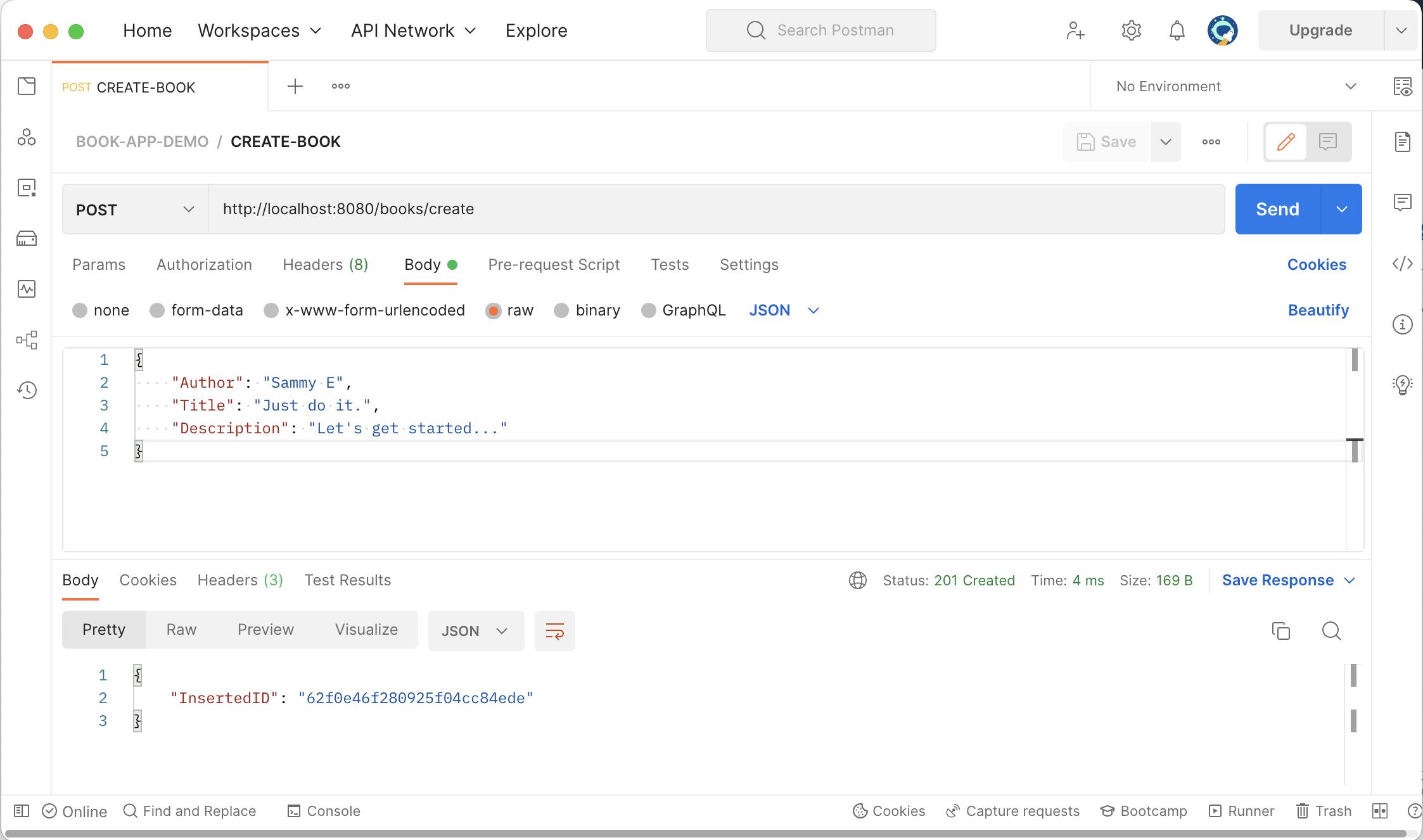
Now our application works as expected. Let's continue with other endpoints. We would create an API to fetch a book item.
- Step 3.4 : Update our
controller/book.controller.gofile by adding the endpoint as shown below ⬇️
func GetBook() gin.HandlerFunc {
return func(c *gin.Context) {
var ctx, cancel = context.WithTimeout(context.Background(), 100*time.Second)
defer cancel()
bookId := c.Param("book_id")
var book model.Book
objectId, _ := primitive.ObjectIDFromHex(bookId)
err := bookCollection.FindOne(ctx, bson.M{"_id": objectId}).Decode(&book)
if err != nil {
c.JSON(http.StatusInternalServerError, gin.H{"error": "Error occured while fetching book."})
return
}
c.JSON(http.StatusOK, book)
}
}
➡️ Let's uncomment the incomingRoutes.GET("books/:book_id", controllers.GetBook()) in our routes/book.route.go file, save then restart your server by running go run main.go
➡️ Kindly note that you'll need to stop and restart your server, after updating the routes/book.route.go file.
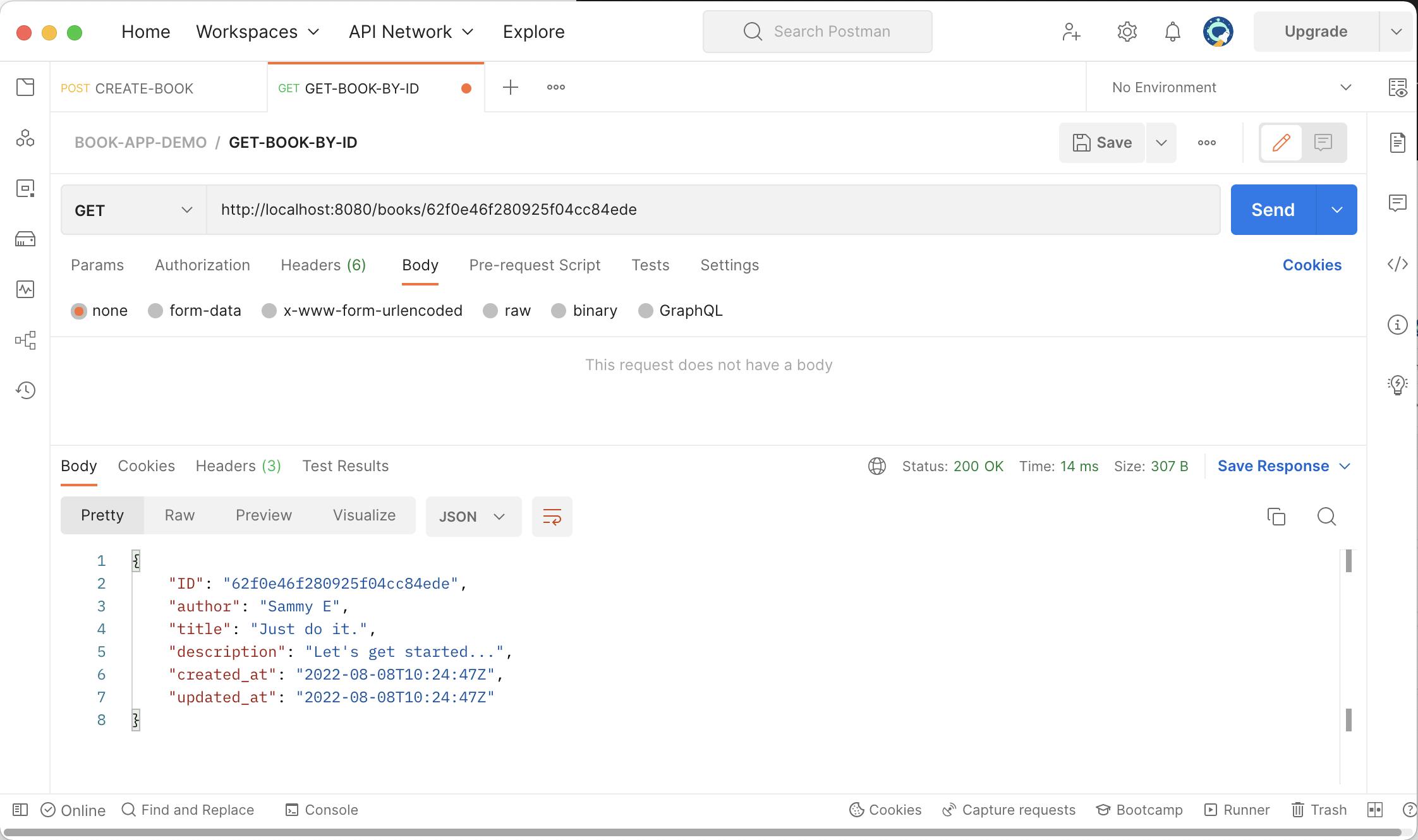
From the image above 👆🏽, we can now fetch a book item.
- Step 3.6 : In
controller/book.controller.go. Let's work on the endpoint to UPDATE a book item
func UpdateBook() gin.HandlerFunc {
return func(c *gin.Context) {
var ctx, cancel = context.WithTimeout(context.Background(), 100*time.Second)
defer cancel()
bookId := c.Param("book_id")
var book model.Book
if err := c.BindJSON(&book); err != nil {
c.JSON(http.StatusBadRequest, gin.H{"error": err.Error()})
return
}
objectId, _ := primitive.ObjectIDFromHex(bookId)
filter := bson.M{"_id": objectId}
var updateObj primitive.D
if book.Author != nil {
updateObj = append(updateObj, bson.E{Key: "author", Value: book.Author})
}
if book.Title != nil {
updateObj = append(updateObj, bson.E{Key: "title", Value: book.Title})
}
if book.Description != nil {
updateObj = append(updateObj, bson.E{Key: "description", Value: book.Description})
}
book.Updated_at, _ = time.Parse(time.RFC3339, time.Now().Format(time.RFC3339))
updateObj = append(updateObj, bson.E{Key: "updated_at", Value: book.Updated_at})
upsert := true
opt := options.UpdateOptions{
Upsert: &upsert,
}
_, err := bookCollection.UpdateOne(
ctx,
filter,
bson.D{
{Key: "$set", Value: updateObj},
},
&opt,
)
if err != nil {
c.JSON(http.StatusInternalServerError, gin.H{"error": "Book item update failed."})
return
}
c.JSON(http.StatusOK, gin.H{"message": "Book item updated successfully."})
}
}
➡️ Let's uncomment the incomingRoutes.PATCH("books/:book_id", controllers.UpdateBook()) in our routes/book.route.go file, save then restart your server by running go run main.go
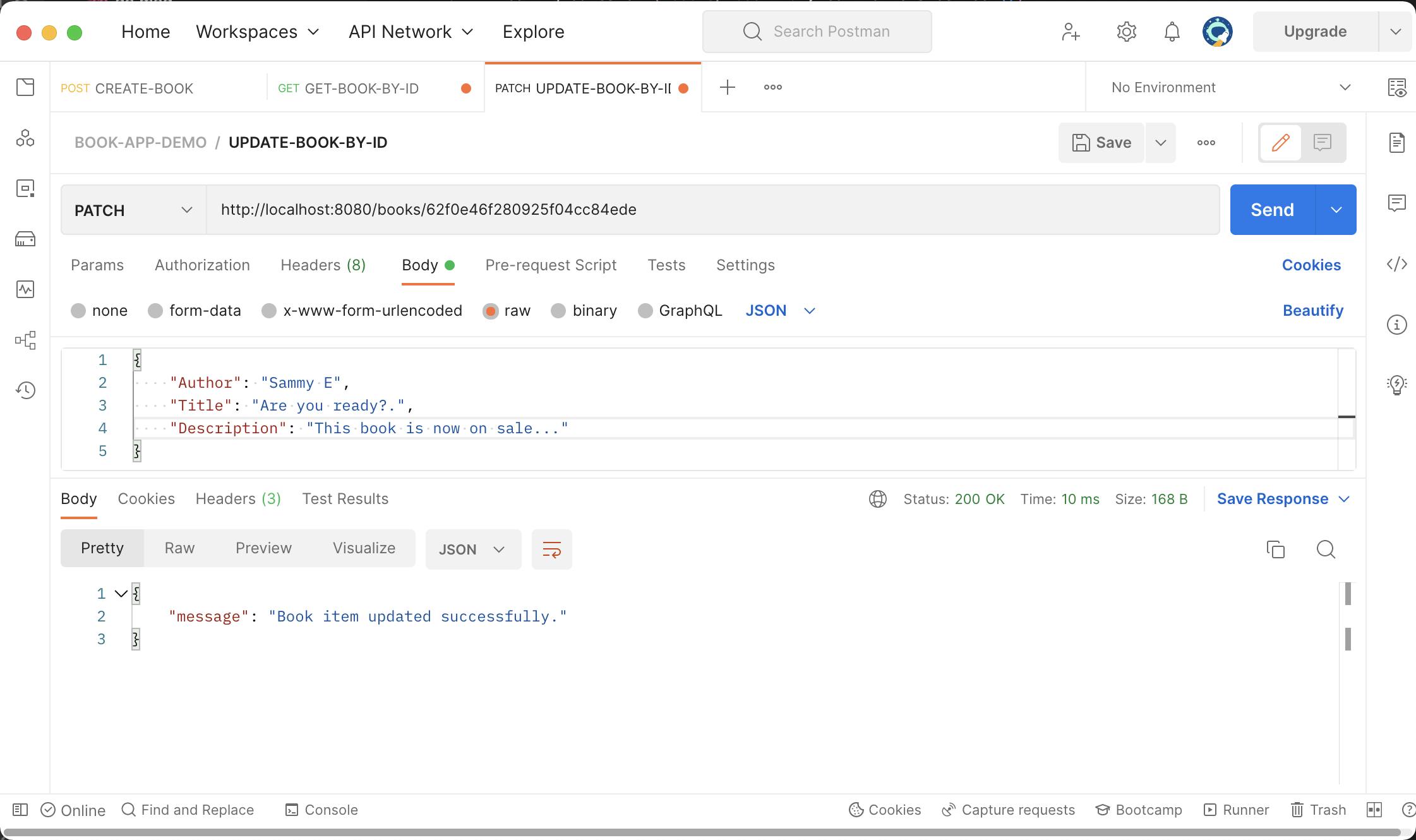
- Step 3.6 : In
controller/book.controller.go. Let's work on the endpoint to DELETE a book item.
func DeleteBook() gin.HandlerFunc {
return func(c *gin.Context) {
var ctx, cancel = context.WithTimeout(context.Background(), 100*time.Second)
defer cancel()
bookId := c.Param("book_id")
objectId, _ := primitive.ObjectIDFromHex(bookId)
_, err := bookCollection.DeleteOne(ctx, bson.M{"_id": objectId})
if err != nil {
c.JSON(http.StatusInternalServerError, gin.H{"error": "Error occured while deleting book item."})
return
}
c.JSON(http.StatusOK, gin.H{"message": "Book item deleted successfully."})
}
}
➡️ Let's uncomment the incomingRoutes.DELETE("books/:book_id", controllers.DeleteBook()) file, save then restart your server by running go run main.go
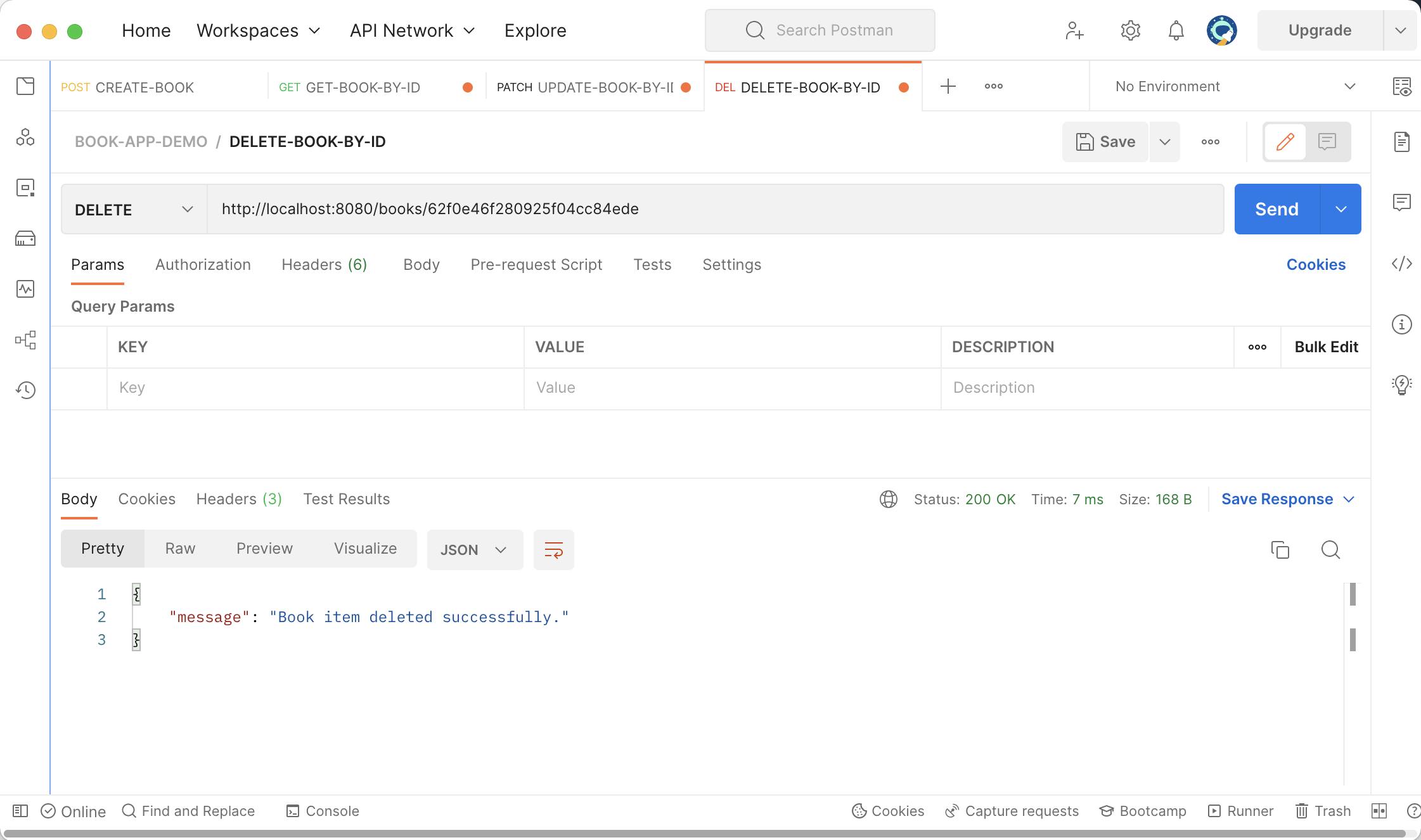
- Step 3.6 : In
controller/book.controller.go. Let's work on the endpoint to FETCH all books.
func GetAllBooks() gin.HandlerFunc {
return func(c *gin.Context) {
var ctx, cancel = context.WithTimeout(context.Background(), 100*time.Second)
defer cancel()
result, err := bookCollection.Find(context.TODO(), bson.M{})
if err != nil {
c.JSON(http.StatusInternalServerError, gin.H{"error": "Error occured while fetching book list"})
return
}
var allBooks []bson.M
if err := result.All(ctx, &allBooks); err != nil {
log.Fatal(err)
}
c.JSON(http.StatusOK, allBooks)
}
}
➡️ Let's uncomment the incomingRoutes.GET("books", controllers.GetAllBooks()) file, save then restart your server by running go run main.go
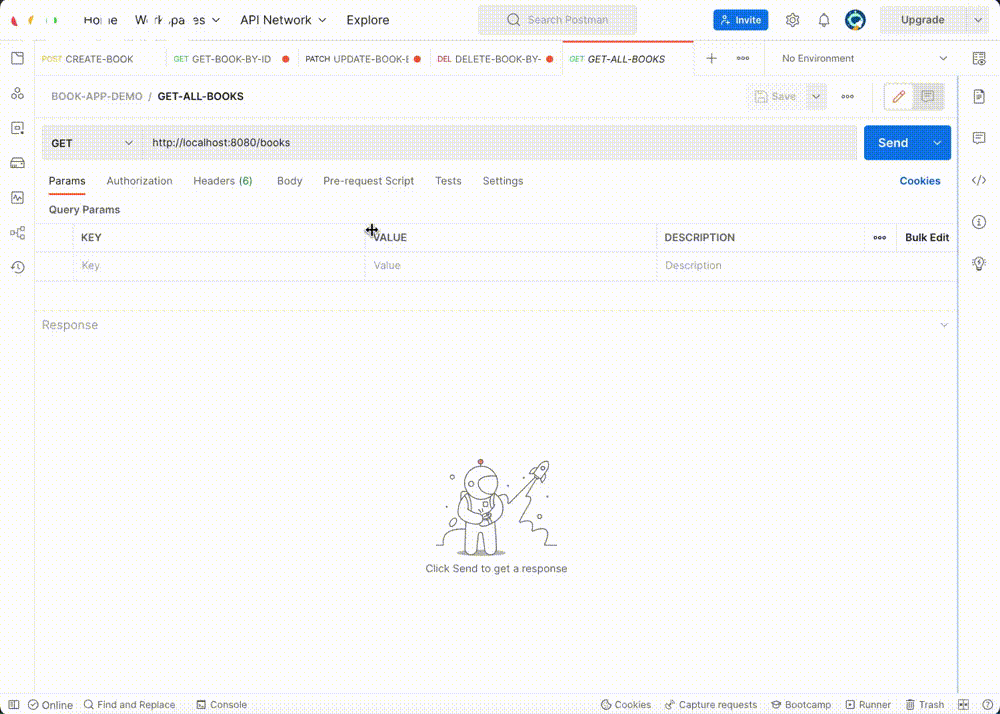
Conclusion
Congratulations 🥳🎉! You have learned how to build feature-rich applications with Go and the Gin framework.
Please feel free to comment with your thoughts and questions.
The source code for this project is also available on Github
Happy coding! 👨🏽💻👍🏽
